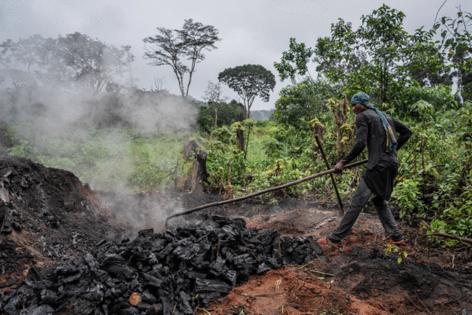Lara Williams: Once our primary forests are gone, they're gone forever
Published in Op Eds
At the 2021 United Nations Climate Conference in Glasgow, 145 nations made a pledge to halt and reverse deforestation and land degradation by 2030. Almost three years later, the call for transformative action is ringing hollow.
Globally, 6.37 million hectares of forest were lost in 2023, and targets to reduce deforestation were missed in almost all tropical regions, according to the 2024 Forest Declaration Assessment. Even more forest— 62.6 million hectares — became degraded (meaning an area fell to a lower ecological integrity class) in 2022. Overall, the world is 45% off its deforestation targets, and, in a frustrating twist, forest-loss levels have risen above a 2018-2020 baseline since the pledge.
The core driver of deforestation is commodity production. Over the past two decades, 57% of permanent forest loss has been caused by the production of agricultural commodities such as beef, soy and palm oil, with about 20% to 25% of that production being exported. Demand for these products has only increased. The E.U. and China were responsible for 40% of all deforestation embodied in the direct trade of agricultural commodities from 2020 to 2022.
Meanwhile, mining and the production of viscose, a fabric made out of cellulose, are emerging threats. While there’s sustainable intentions behind the rise in certain commodities — viscose has been marketed as eco-friendly, and the appetite for metals and rare-earth elements is being partly driven by the energy transition — it’s a reminder that consumption, green or not, will have impacts on carbon sinks and natural ecosystems. As I wrote last year, as much as 40% of viscose comes from sources likely to be linked to deforestation. Though, as my colleague David Fickling rightly points out, in Indonesia where there’s been a lot of focus on the threat of nickel mining, palm oil remains the biggest danger by far.
Efforts to eliminate deforestation from supply chains have largely been voluntary corporate commitments. While these pledges have steered the conversation and helped the development of traceable, it’s clear that they aren’t enough to deliver results at a sufficient pace.
That’s why policy experts and forest advocates alike have been pushing for demand-side regulation — essentially a ban on the import of deforestation-linked goods — in consumer countries for years.
Though great strides have been made toward this, nations now seem to be dragging their feet. Considering this latest report, it looks particularly egregious. Take, for example, the E.U.’s Deforestation Regulation (EUDR), which covers seven commodities: cattle, cocoa, coffee, oil palm, rubber, soya, and wood and their derivatives (glycerol, soybeans, leather etc.) Due to come into force from Dec. 30, 2024, for medium and large operators and traders, the new rules will require companies trading in those products to ensure the goods don’t result from recent deforestation (including legal clearing), degradation or breaches of local environmental and social laws.
Yet, in a shock twist at the start of October, the European Commission adopted a proposal to delay the implementation of the EUDR for another 12 months, a week after saying it had no plans to do so. The postponement needs to be approved by the European Parliament to become official. Meanwhile, supermarkets have taken to urging the U.K. to press ahead with its own long-promised anti-deforestation law, saying holdups are causing market uncertainty and undermining retailers’ own efforts.
There are reasonable concerns about the effects of the regulation on smallholder farmers in forest nations, who may be excluded from the global market if they lack the resources to comply. Any delay must be used productively to help build capacity in these areas and support national traceability systems, so that when rules are implemented, smallholders can reap the benefits. There’s a risk that the deferral will instead be used to dilute the EUDR or ditch it altogether. That would be a mistake.
Import regulation won’t solve everything. A study published in the journal Nature earlier this year found that the main economic driver for deforestation in the Brazilian Amazon is the domestic market, which is responsible for almost triple the deforestation generated by international demand. But it will influence regulation and practices in producer countries, which should have positive knock-on effects for forest supply chains around the world. which is almost triple that of international demand.
Once primary forest is gone, it’s gone forever, taking with it precious carbon stores and biodiversity havens. There’s no time to waste in making good on what have so far been empty words.
_____
This column does not necessarily reflect the opinion of the editorial board or Bloomberg LP and its owners.
Lara Williams is a Bloomberg Opinion columnist covering climate change.
_____
©2024 Bloomberg L.P. Visit bloomberg.com/opinion. Distributed by Tribune Content Agency, LLC.




























































Comments